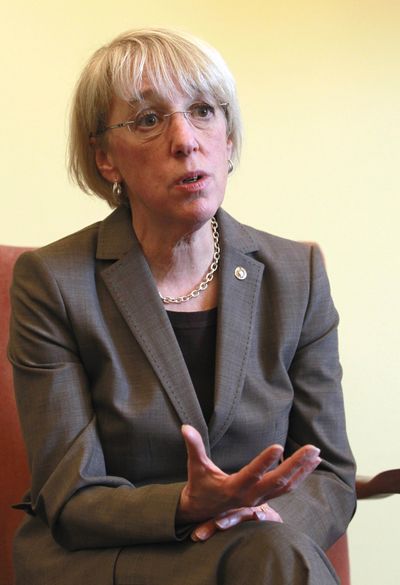Murray holds first public meeting as VA chairwoman

Unlike active duty soldiers, National Guard and Reserve troops return from war to civilian lives without being able to decompress by sharing their military experiences with comrades on military bases.
Yet the United States relies on these “citizen soldiers” more than at any time since World War II, and their repeated deployments to Iraq or Afghanistan have taken a heavy psychological toll, veterans and counselors told U.S. Sen. Patty Murray, D-Wash., on Wednesday.
In her first public meeting with constituents since being appointed chairwoman of the Senate Veteran Affairs Committee, Murray met with about 250 military veterans at Veterans of Foreign Wars Post 51 in Spokane on Wednesday.
Some of the veterans’ complaints were familiar, including long waits for disability benefits.
“I’m holding Secretary (Eric) Shinseki personally responsible for reducing those waiting times as he has promised,” Murray told the crowd.
But other concerns were unique to a new era in the military in which Guard and Reserve soldiers comprise more than half of U.S. forces serving in combat zones and a fifth of troops are women.
David Baird, team leader at the Spokane Vet Center, which provides counseling to combat veterans, said the Guard and Reserve are essential to U.S. military actions in Iraq and Afghanistan.
“It couldn’t have happened without them,” Baird said of the Guard and Reserve. “With this protracted global war on terror, their whole mission has changed.”
It is not uncommon, Baird said, for Guard and Reserve soldiers to be deployed two or three times. He has counseled some who have been deployed as many as seven times since the United States went to war with Iraq eight years ago.
If they suffer from psychological problems as a result of their military experience, Baird said, “every time they are re-exposed to trauma it further exacerbates the issue.”
Mike Ogle, a Vet Center counselor, recommended that after deployment, Guard and Reserve serve an additional 90 to 120 days of active duty in their home station, where they can readjust to civilian life among their friends and families while receiving counseling and employment services.
“We need a transition assistance program,” Ogle said.
Taking questions from the audience, Murray heard a woman veteran say she received an early discharge from the U.S. Navy after seven years of service because she complained of military sexual trauma.
Instead of dealing with the cause of her trauma, she said, the Navy labeled her with “unspecified personality disorder” and let her go. She had to pay back part of her re-enlistment bonus as a result, she said.
Vet Center counselor Brenda Thurman said what happened to the veteran is all too common in the U.S. military, where sexual trauma among both men and women is dismissed and victims are stigmatized.
Murray said the Veterans bill that she helped enact last year requires VA hospitals to have specialists in military sexual trauma on staff. But it also is time for “the military to deal” with the issue, she said.